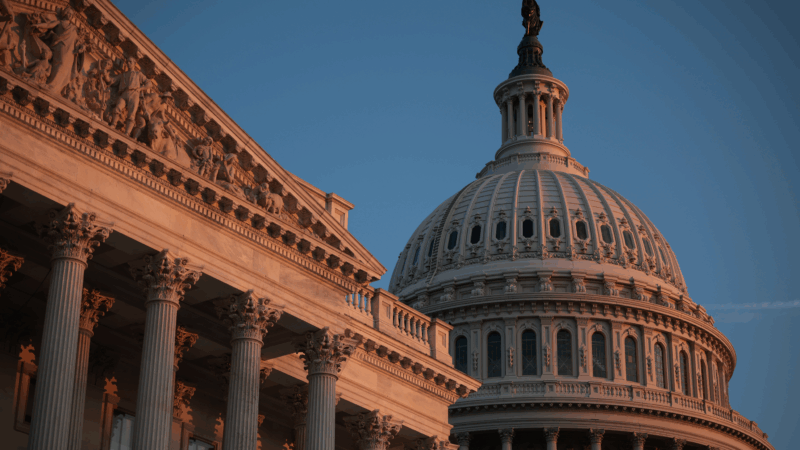A ‘Crypto Week’ win: Congress passes 1st major crypto legislation in the U.S.
The United States Congress passed the country’s first major standalone crypto bill on Thursday.
The landmark vote signals a sea change in the U.S. stance toward these digital currencies.
The House approved the GENIUS Bill with a 308-122 vote with significant Democratic support, adopting regulations for a type of cryptocurrency known as stablecoins that proponents believe will fundamentally change the world of commerce.
It was a remarkable win for the crypto industry — and for President Trump, who campaigned on making the U.S. “the crypto capital of the planet.” He, along with his family, also stand to benefit from this, given their financial interests in a crypto company that has issued its own stablecoin.
In fact, the president had a key role to play in its passage. Although the House easily had the votes to pass the bill during what it had dubbed “Crypto Week,” it came after an arduous process when some Republican lawmakers objected to the way leaders had intended to pass two other crypto bills.
It ultimately required President Trump’s intervention to convince the lawmakers and then a really long vote to clear all the procedural hurdles.
The GENIUS Bill, which stands for “Guiding and Establishing National Innovation for U.S. Stablecoin” now heads to the president’s desk for his signature, since the Senate had already approved it last month.
“Advancement of this bill to President Trump’s desk marks a historic milestone for crypto entrepreneurs, financial market participants, and everyday Americans,” said Securities and Exchange Commission Chairman Paul Atkins in a statement.
With its passage, the U.S. is now formally adopting a new set of rules for cryptocurrencies — ones that critics view as far too easy. It also marks a sharp turn from the Biden administration’s approach of seeking to get crypto companies follow the far tougher rules for Wall Street.
More crypto legislation is expected to follow the GENIUS Act. There’s another bill intended to provide more clarity about which regulatory agencies will oversee the different aspects of crypto. Another seeks to ban the U.S. from adopting a digital version of the dollar. Those, however, now need to be passed by the Senate.
So, what are stablecoins?
The new legislation will put more formal regulations around stablecoins, which is viewed by many as a safer type of cryptocurrency. That’s because companies selling stablecoins have to hold the equivalent dollars in reserve.
So if you buy $1 in stablecoin, the issuer that provided you with one has to keep $1 in reserve. That means that when you want to cash it, you can get paid back promptly.
Stablecoins are a hot emerging part of the crypto sector. Key industry players believe stablecoins will allow people and companies the ability to transfer money as digital currency anywhere in the world instantaneously, regardless of borders, without onerous and expensive bank or money transfer fees. They believe that the world of credit cards or wire transfers will be completely upended once they are adopted widely.

It’s attracted a lot of interest from banks such as JPMorganChase and retailers like Amazon and Walmart, all of whom are said to be considering launching their own stablecoins. For the retailers it could mean avoiding the credit card fees they pay when customers make purchases.
Controversially, even President Trump now stands to benefit financially from stablecoins. World Liberty Financial, in which his family has financial interests, has issued a stablecoin called USD1 (though it’s market share is miniscule).
The GENIUS Act comes after heavy lobbying
Passage of the bill came after intense lobbying from the crypto industry, which spent over $100 million in Congressional races last year and is building an even heftier war chest ahead of next year’s midterms. That kind of spending had critics calling foul.
“This is what political power can buy you,” says Corey Frayer, director of consumer protection for the Consumer Federation of America.
The crypto sector’s war chest not only helps win supporters, Frayer says, they also silence Democrats and other lawmakers who might be opposed but “are just plain scared that crypto is going to come to their town and spend enormous amounts of money against them.”
Among other aspects, the bill seeks to formalize rules for stablecoins, mandating that companies must ensure they are holding proper reserves and are providing information about their holdings. It also introduces anti-money laundering rules and other regulations intended to address concerns that stablecoins are being used by criminals such as ransomware hackers, drug cartels or even regimes under sanction.
But critics warn the rules are not strong enough, and they add that the bill would allow non-financial institutions to issue their own stablecoins without having to follow all the rules that banks and other financial firms must follow.
“The stablecoin industry has claimed that it is a new payment system with better infrastructure than the payment system we’ve been using for years,” says Frayer. “But the purpose of the bill is to give them the veil of regulation.”
Team USA faces tough Canadian squad in Olympic gold medal hockey game
In the first Olympics with stars of the NHL competing in over a decade, a talent-packed Team USA faces a tough test against Canada.
PHOTOS: Your car has a lot to say about who you are
Photographer Martin Roemer visited 22 countries — from the U.S. to Senegal to India — to show how our identities are connected to our mode of transportation.
Looking for life purpose? Start with building social ties
Research shows that having a sense of purpose can lower stress levels and boost our mental health. Finding meaning may not have to be an ambitious project.
Sunday Puzzle: TransformeR
NPR's Ayesha Rascoe plays the puzzle with listener Joan Suits and Weekend Edition Puzzlemaster Will Shortz.
Danish military evacuates US submariner who needed urgent medical care off Greenland
Denmark's military says its arctic command forces evacuated a crew member of a U.S. submarine off the coast of Greenland for urgent medical treatment.
Only a fraction of House seats are competitive. Redistricting is driving that lower
Primary voters in a small number of districts play an outsized role in deciding who wins Congress. The Trump-initiated mid-decade redistricting is driving that number of competitive seats even lower.






